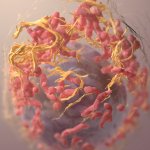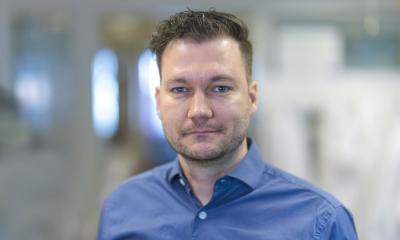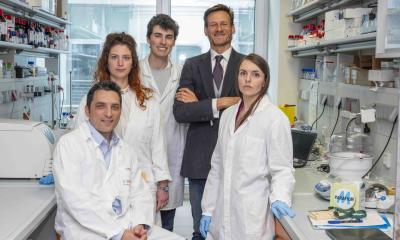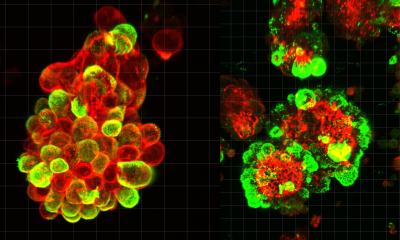News • In vitro disease models
'Intrepid' research to advance cancer therapies
Ambitious new UK project to transform human disease modelling

Image source: University of Leicester
A major new initiative involving Leicester experts aims to redefine human-based research models for greater understanding of disease and the acceleration of new medicines. The joint £15.9 million investment by the UKRI Medical Research Council (MRC), Wellcome and UKRI Innovate UK will enable the development of advanced, specific and highly reproducible human in vitro models with the aim of making them widely available to researchers in academia and industry.
In vitro models use isolated cells and tissues outside the living body and can come in many forms, including stem-cell derived cell and tissue aggregates that display some organ features on a smaller scale (organoids), tissue slices removed during surgery (ex vivo/explant tissue cultures); and organ-on-chips, which combine cell culture with microfluidics to mimic the structure and function of different organ tissues. In vitro models will also provide new alternatives, helping to reduce the reliance on animal models in research and drug development.
A co-ordinated network of five interdisciplinary teams will focus on the development of in vitro disease models of liver, brain, cancer, pain and blood vessels.
Catrin Pritchard, Professor of Cancer Biochemistry in the Division of Cancer Sciences at the University of Leicester, will lead a team aiming to tackle the barriers associated with widespread adoption of live human tumour tissue explant models, removed during surgery, to drive a step change in their use in the cancer research community. She will lead researchers from Leicester as well as Imperial College, Oxford University, University College London, MRC Toxicology Unit University of Cambridge, and Medicines Discovery Catapult.
Cancer is a complex disease that impacts patients in diverse ways, highlighting the need for preclinical models that accurately represent this variability.
Gayle Marshall
Professor Pritchard will bring together an interdisciplinary team of biologists, bioengineers, clinicians, computational scientists and technologists to work on the INTREPID (IN vitro TumouR Explant models for evaluating cancer complexity and Patient Diversity) project with the aim to:
- improve our understanding of human cancer mechanisms and better support therapeutic development for disease intervention
- overcome limitations of current in vivo and in vitro models for cancer to better represent human pathophysiology and differences in disease
- accelerate the development, validation and uptake of the explant model system to mirror patient diversity and reduce the reliance on in vivo models
Speaking about the project, she said: “We are delighted to receive this award to deliver better outcomes for cancer patients. While a lot of the initial work will be on technical development of the explant platform, we will also be testing a range of advanced cancer therapies with the goal of designing personalised treatment strategies for individual patient benefit.”
Existing preclinical models for cancer, including in vivo and multi-cellular models, cannot capture the full spectrum of cancer complexity needed to accurately predict a patient’s response to anti-cancer therapies. This means that preclinical results may not translate into successful clinical trials, and potential game-changing new therapies can take longer to reach patients.
Living samples taken directly from patients’ tumours offer a powerful and more predictable alternative. They maintain the natural structure and cell interactions found in real tumours, including the immune system and blood vessel systems, while also accommodating patient diversity. This, in turn, should help scientists to predict which new therapies have the most potential more accurately.
Melanie Davies, Professor of Diabetes Medicine and Director of the Leicester NIHR Biomedical Research Centre, said: “I was delighted to hear that UKRI have funded the INTREPID programme which supports the development of novel human in vitro models to evaluate cancer complexity and patient diversity. Professor Pritchard, Dr Miles and Dr Khan, three of the key researchers in our NIHR Leicester Biomedical Research Centre Personalised Cancer Prevention and Treatment Theme, led this bid. This is another example of Leicester’s standing at the forefront of groundbreaking biomedical research.”
Gayle Marshall, Head of Biomarkers at Medicines Discovery Catapult, said: “Cancer is a complex disease that impacts patients in diverse ways, highlighting the need for preclinical models that accurately represent this variability. As part of the INTREPID programme, Medicines Discovery Catapult will apply a range of advanced technologies and leverage its expertise in drug discovery to enhance the development and validation of these urgently needed models. The research conducted through INTREPID will play a crucial role in accelerating the creation of new medications for cancer, ultimately supporting better outcomes for patients.”
Recommended article

Article • Awareness
Focus on cancer
From solid tumors to metastatic carcinomas and leukemia: cancer is among the most common causes of death. Keep reading for latest developments in early detection, staging, therapy and research.
Professor Marion MacFarlane, Deputy Director of the MRC Toxicology Unit said: “We are delighted to be part of the INTREPID Programme as following initial technical development of the explant platform, a range of advanced cancer therapies will also be tested. This complements our other research into understanding the off- and on-target toxicities of nucleic-acid dependent therapeutics.”
A key ambition of the new investment is strategic coordination across the network of supported projects and to create connectivity with wider UK capabilities, including industry to join efforts and address common challenges in the field.
The funding was delivered in partnership with the National Centre for the Replacement, Refinement and Reduction of Animals in Research (NC3Rs).
Source: University of Leicester
23.11.2025





